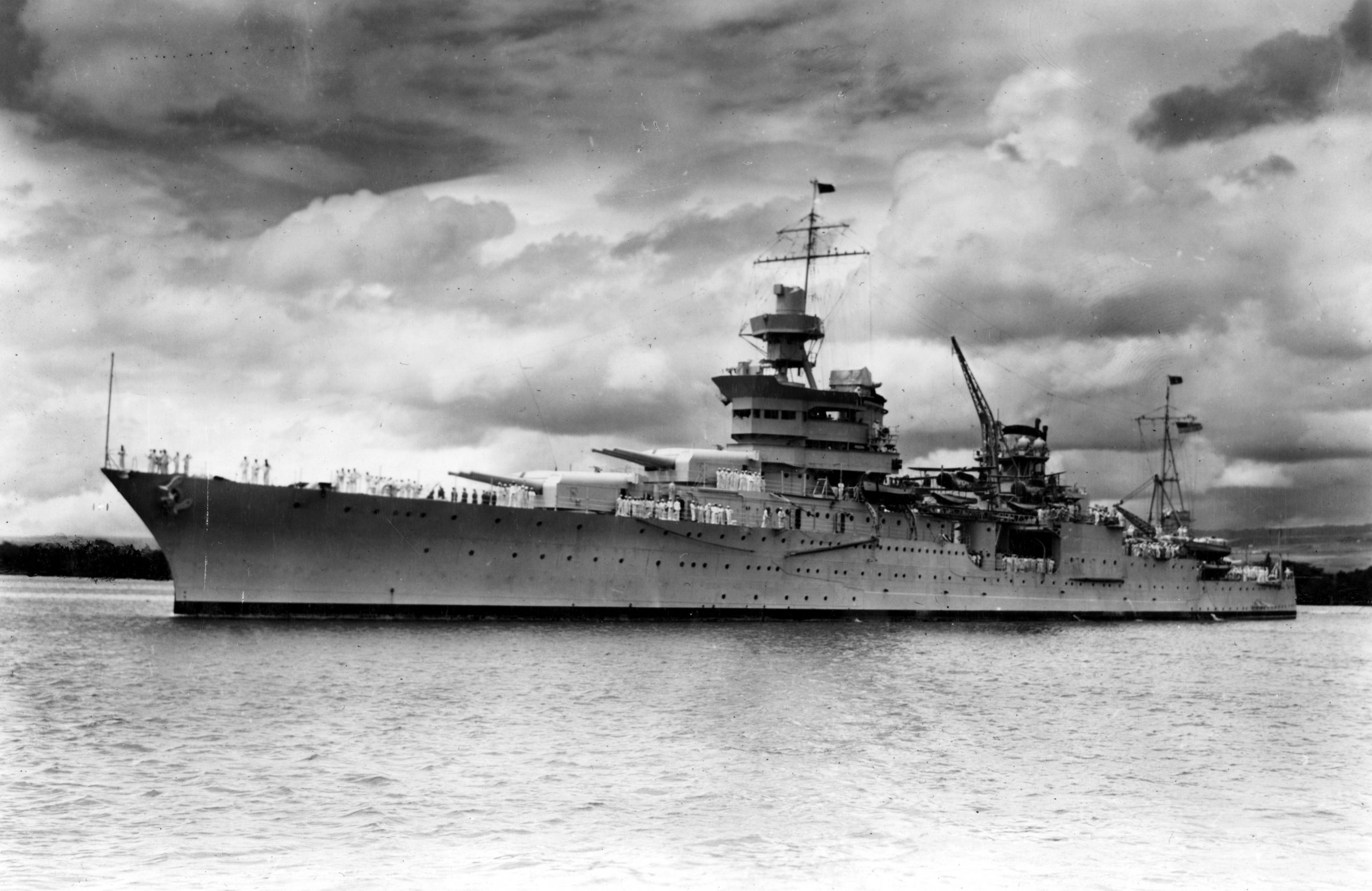Civilian researchers led by entrepreneur and philanthropist Paul G. Allen have announced they have found the wreck of the World War II cruiser USS Indianapolis, which was lost July 30, 1945.
Civilian researchers led by entrepreneur and philanthropist Paul G. Allen have announced they have found the wreck of the World War II cruiser USS Indianapolis, which was lost July 30, 1945.

The Portland-class heavy cruiser USS Indianapolis underway in Pearl Harbor in 1937
This is a significant discovery, officials said, considering the depth of the water in the area in which the ship was lost: more than 18,000 feet. About 800 of the ship's 1,196 sailors and Marines survived the sinking, but after four to five days in the water — suffering exposure, dehydration, drowning and shark attacks — only 316 survived.
The wreck was located by the expedition crew of Research Vessel Petrel, which is owned by Allen, 2,000 feet below the surface, resting on the floor of the North Pacific Ocean.
"To be able to honor the brave men of the USS Indianapolis and their families through the discovery of a ship that played such a significant role in ending World War II is truly humbling," Allen said. "As Americans, we all owe a debt of gratitude to the crew for their courage, persistence and sacrifice in the face of horrendous circumstances. While our search for the rest of the wreckage will continue, I hope everyone connected to this historic ship will feel some measure of closure at this discovery so long in coming."
Ship Sank in 12 Minutes
The ship was lost in the final days of World War II when it was torpedoed by a Japanese submarine in the early morning hours of July 30, 1945. It sank in 12 minutes, making it impossible to send a distress signal or deploy much of its life-saving equipment. Prior to the attack, the Indianapolis had just completed a secret mission delivering components of the atomic bomb used in Hiroshima that ultimately would help to end the war in the Pacific.
"Even in the worst defeats and disasters, there is valor and sacrifice that deserves to never be forgotten," said Sam Cox, director of the Naval History and Heritage Command. "They can serve as inspiration to current and future sailors enduring situations of mortal peril. There are also lessons learned — and in the case of the Indianapolis, lessons re-learned — that need to be preserved and passed on, so the same mistakes can be prevented and lives saved."
Others have searched for Indianapolis in the past. Among the elements that made this effort different was Allen's recent acquisition and retrofit of the 250-foot R/V Petrel with state-of-the-art subsea equipment capable of diving 3 and a half miles.
Culmination of Lengthy Effort
"The Petrel and its capabilities — the technology it has and the research we've done — are the culmination years of dedication and hard work," said Robert Kraft, director of subsea operations for Allen. "We've assembled and integrated this technology, assets and unique capability into [an] operating platform, which is now one amongst very few on the planet."
The other key factor in the discovery was information that surfaced in 2016 when Dr. Richard Hulver, historian with the Naval History and Heritage Command, conducted research that led to a new search area to the west of the original presumed position. Hulver's research identified a naval landing craft that had recorded a sighting of Indianapolis hours before it was torpedoed. Using that information, the research team developed a new position and estimated search, which was still a daunting 600 square miles of open ocean.
Allen-led expeditions have also resulted in the discovery of the Japanese battleship Musashi in March 2015 and the Italian World War II destroyer Artigliere in March of this year. His team also was responsible for retrieving and restoring the ship's bell from the HMS Hood for presentation to the British navy in honor of its heroic service. Allen's expedition team recently was transferred to the newly acquired and retrofitted R/V Petrel specifically for continuing exploration and research efforts.
Surveying Wreckage Site
The 13-person expedition team on the R/V Petrel is surveying the full site and will conduct a live tour of the wreckage in the next few weeks, officials said.
Their work is compliant with U.S. law, respecting the sunken ship as a war grave and not disturbing the site, officials added. USS Indianapolis remains the property of the U.S. Navy and its location will remain confidential and restricted by the Navy. The crew of the R/V Petrel has collaborated with Navy authorities throughout its search operations and will continue to work on plans to honor the 22 crew members still alive today, as well as the families of all those who served on the highly decorated cruiser.
The Naval History and Heritage Command, located at the Washington Navy Yard, is responsible for the preservation, analysis, and dissemination of U.S. naval history and heritage. It provides the knowledge foundation for the Navy by maintaining historically relevant resources and products that reflect the Navy's contributions through the nation's history, and it supports the fleet by assisting with and delivering professional research, analysis, and interpretive services. The command is composed of many activities, including the Navy Department Library, the Navy Operational Archives, the Navy art and artifact collections, underwater archaeology, Navy histories, 10 museums, the USS Constitution repair facility and the historic ship Nautilus.










